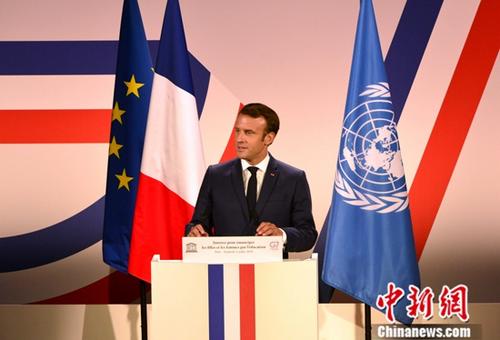China News Agency, Berlin, July 1st (Reporter Peng Dawei) On the 1st, Germany officially took over the rotating presidency of the European Union, beginning a half-year term.
Although the new crown epidemic has gradually stabilized in most EU countries, member states have yet to agree on how to get out of the unprecedented economic recession brought about by the epidemic.
During the financial crisis of 2008-2009, Germany took the lead out of the predicament among the EU countries and became the locomotive of European economic recovery. Now, what is the "European policy" that Germany, the largest country in the EU with the largest economic aggregate and population, will provide for the emergence of the crisis?
"Germany and France axis" wants to solve the problem "joint debt"
"The new crown pandemic is probably the most important challenge we know to be about the survival of the European Union," wrote the latest policy brief of the Munich Security Conference published on June 30. Merkel bluntly said: "If the EU wants to survive, its economy must survive."
Data map: German Chancellor Angela Merkel. China News Service reporter Peng Dawei
The latest issue of the International Monetary Fund (IMF) "World Economic Outlook" predicts that the Eurozone economy will experience a recession of 10.2% this year. Even in Germany, where Europe has relatively successfully responded to the epidemic, there have been large-scale layoffs by top companies such as Lufthansa and BMW.
The IMF expects a 7.8% recession in the German economy this year. In France and Spain, Italy and other southern European countries that have been hit harder by the epidemic, the recession this year may reach 12.5%-12.8%.
Against this background, Germany rarely gave up its stance against the EU's "common debt" for many years. On May 18, Merkel and French President Macron jointly proposed the establishment of a "recovery fund" of 500 billion euros to help the EU economy get back on track. Subsequently, on the basis of this initiative, the European Commission President Von Delaine further proposed an economic recovery plan of 750 billion euros, including the implementation of 500 billion euros of free appropriations and 250 billion euros of loans. On June 29, Macron and Merkel reiterated the support of Germany and France for this plan.
Data map: French President Macron. China News Service reporter Li Yangshe
Hubertus Vaeth, managing director of the Frankfurt Financial Cooperation Association, told reporters from China News Agency that this is an important step towards a more in-depth integration of the EU and will give the EU greater financial strength. He analyzed and pointed out that Germany has not traditionally been a supporter of large-scale co-financing, but it is a "strong response" to the current crisis by launching and supporting this 500 billion euros aid plan with France.
However, the German-French master's recovery fund was opposed by Austria, the Netherlands, Sweden, and Denmark, both members of the European Union. Whether the EU countries can reach consensus on the recovery fund within July, as Macron urged on June 29, is expected to be a difficult problem to be solved first after Germany takes over the EU rotating presidency.
"Brexit" negotiations and the double test of transatlantic relations
In terms of relations with the United States, the two sides have continued to resist the trade issue, and there is no sign of dissolution. The recent announcement by the US President of the withdrawal of 9,500 US soldiers from Germany will undoubtedly make the relationship between the two sides more uncertain. In this regard, Merkel said recently that if the United States now wishes to voluntarily withdraw from its role as a superpower, "then we will have to think very thoroughly about this (to the US relationship)."
Data Map: British Prime Minister Johnson.
In the UK's "Brexit" negotiations, facing the transition period of only half a year, the British Prime Minister Johnson recently said that if it still fails to reach an agreement with the EU to determine the future relationship between the UK and the EU, the UK is ready to withdraw from the "Australian terms" EU-Australia does not have a comprehensive trade agreement with the EU, and its trade relations follow the WTO’s default rules.
Merkel expressed a relatively strong position on the issue of "Brexit". She said that if the UK does not want to maintain environmental protection, labor market and social welfare standards that match EU rules, then "our relationship will become less close."
The epidemic highlights the importance of strengthening China-EU cooperation
Gent Ettinger, a former member of the European Union, said recently that maintaining a good and deep relationship with China is not only in the interest of Europe, but also conducive to maintaining global stability.
Chinese Ambassador to Germany Wu Ken said in an exclusive interview with China News Service that the epidemic highlights the importance of international cooperation. In particular, China and the EU are both important international forces. Against the backdrop of the severe impact of the epidemic on the world economy and the prevalence of unilateralism and protectionism, the importance of strengthening China-EU cooperation has become more prominent.
"Since the epidemic, China and the EU have supported each other and overcome difficulties together, expanding the connotation of China-EU comprehensive strategic partnership. In the next stage, both parties will actively promote the relevant political agenda, promote the negotiation of the China-EU investment agreement, and expand the areas of interconnection, ecological protection, and digital economy. Mutual benefit cooperation in new fields such as artificial intelligence and artificial intelligence, jointly safeguard multilateralism and free trade, and achieve quality and upgrade of cooperation." Wu Ken said. (Finish)

